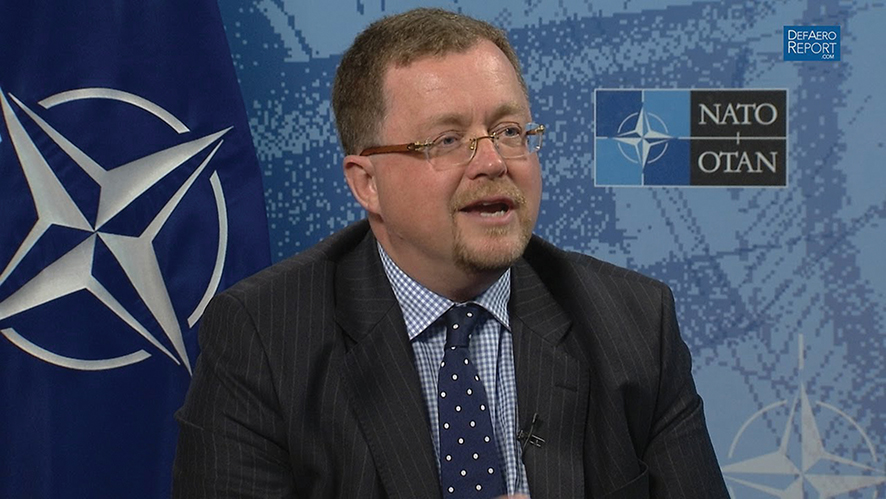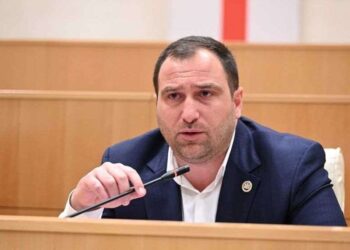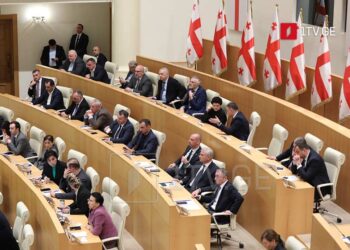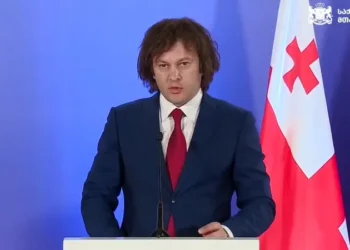On 17 July, Secretary General Jens Stoltenberg revealed the selection of a Senior Representative to head the NATO Representation in Ukraine (NRU). Patrick Turner is set to take up the role in Kyiv in September. His prior experience includes roles as NATO Assistant Secretary General for Operations, Assistant Secretary General for Defense Policy and Planning, and various high-ranking civil service positions in the United Kingdom. Radio Free Europe/RL’s Georgian Service spoke to him two days prior to the Sec Gen’s announcement.
Recent events cast a rather large shadow on the NATO summit in Washington DC. How much of a headache is that for the rest of the alliance? And how much rides on its eventual outcome for Ukraine?
I’d say it’s true that the American political debate, or crisis, however you might term it, was tactically a bit of a distraction during the summit, but it didn’t affect the actual outcomes of the summit. Europe, like the rest of the world, is waiting with more than considerable interest for the election results in November.
On the NATO front, there is recent NATO polling evidence which shows strong support for NATO across the alliance. In the US, and across the political divide in the US, there continues to be strong support for NATO in Congress on both sides of the political aisle. So I am rather confident, and I have certainly been hearing that Jens Stoltenberg, the Secretary General, is confident that, irrespective of the outcome of the US election, there will be good support for NATO. He said in the case of the first Trump presidency, the focus was on defense spending. And President Trump said, and in my view he was right to say, it is not reasonable to expect American taxpayers to care more about defending Europe than European taxpayers. So if there are a large number of allies who are not meeting their commitments and their obligations, then that’s unacceptable. And, indeed, it was unacceptable. So now you have 23 out of 32 allies who have already got to 2%, and the remaining allies have plans to get to 2%. So we’re not in all respects where we need to be, but we are much closer. As I can imagine, the demand will go even higher in the case of either a Democrat or a Republican administration next time around.
Georgian membership in NATO would be a challenging thing even with the standards met
On support to Ukraine, I’m not going to make a prediction on how things might look here next year, but my experience over the years is that some of the things said on a campaign trail, or quite a few of the things said on a campaign trail, don’t necessarily translate into facts and policy. So let’s wait and see. So far, support to Ukraine has been pretty unified and much stronger than Putin would ever have counted on. And I count on that continuing to be the case.

What would former President Trump “ending the war in 24 hours” entail if we were indeed to see Trump making a return to the presidency?
I can’t speculate on behalf of somebody else as to what that might mean in practice. I can imagine that some of that rhetoric may continue in the coming months. What is super clear now, and has been made as explicit as it could possibly be, is that Russia is not in the mood to negotiate. They made it clear this week during the summit that their strategic intent is to dismember Ukraine, for Ukraine as a separate country to cease to exist. So they were saying as clearly as they could, “if anyone amongst you is dreaming of negotiating, then it’s not a dream that we share.” And on the Ukrainian side, Ukrainian friends have been saying “we’re not going to be engaging in discussions about losing Ukrainian territory or ceding Ukrainian territory.”
At the same time, I don’t like hypotheticals, but if negotiating with Putin were to mean making it even plainer than now that there is no path to victory, only a path to defeat [for Russia], and saying that more means will be used to achieve that, then I’d be in favor of that kind of negotiation. But I’m not sure whether that is what is meant. But more pressure on Russia, more clarity that there is no way that they’re going to achieve their objectives, would only be a good thing.
Putin also said of Trump’s proposal that “we don’t know what it entails, but at least we know his intentions are honest.” Don’t you think that adds color to the picture?
So far, whenever Russia has said, “we might be interested in talking,” or “we have a peace proposal,” their proposals mean they get to keep what they’ve taken. And that’s not a peace proposal.
Would you consider that unthinkable and absolutely unacceptable for a future Trump administration?
I can’t see how it is an acceptable outcome. The Friends of Ukraine, NATO allies, the summit this week, has said, “we will never recognize Russian annexations in Ukraine.” Not Crimea, not the Donbas, not territory currently occupied beyond the Donbas. We will never recognize it. And NATO and NATO allies have been in this position before. I think there were over 50 US statements made while the Baltic states were occupied, saying we will never recognize that the Baltic states are part of the Soviet Union, they are independent countries. It may be that we’re going to be in that position for many years, and we will never recognize them. So no, I think a path to carving up somebody else’s country is not a path that we should be travelling on. And were it our own country, were it the UK, I’m British, or Germany or France or the US, we would not be willing to contemplate that path. But as ever, we will have to see what the future holds.
A path to carving up somebody else’s country is not a path we should be travelling on
Ukraine has been amazingly clear and resolute. They’ve held the line in an extraordinary way against a much larger and more capable adversary. Russia suffered incalculable losses that would be politically impossible to bear in any of our countries. And Ukraine is showing no signs of saying, “we’ve had enough.” I think they’ve been successful in revamping conscription in Ukraine and making sure that they continue to be able to fight. So I think it is clear that we should continue to support them.
Speaking of continued support to Ukraine – a curious word has crept into the final declaration: “irreversible.” How irreversible is this?
Personally, I’m not a big believer in attributing too much meaning to precise words. Back in 2008, NATO said plainly that Georgia and Ukraine would become members of NATO, so you could say “well that was pretty irreversible.” Yes, it was a clear political intent, but not a great deal has happened since then to give that meaning, and you had the same words used at the Vilnius NATO summit last year when conditions allowed and allies agreed on the membership of Ukraine, though there’s still that caveat, “membership is not happening while the war is happening.”
I think that the degree of collective political commitment by allies to support Ukraine, and provide the assurance of support in the longer term, and to engage with Ukraine on making sure that in every way it is ready for membership, has increased. In my view it is, in essence, ready for membership now, but that’s not the view of all NATO allies.
For the first time, Georgia’s aspirations are not even mentioned in the NATO declaration. Is the “open door” finally being shut? Where would that leave Georgia?
Georgia had an invitation, a clear invitation, and made a statement that it intended to join NATO, but when countries change their approach, cease to aspire temporarily, when there are political changes internally which makes aspiration to join NATO uncredible for the allies, then, of course, there are consequences.
NATO is not in the business of pressing or demanding countries to join NATO. NATO is in the business, as we’re seeing in Ukraine, of saying “there are standards that have to be met.” But Georgian membership in NATO would be a challenging thing even with the standards met, both for the allies and for Georgia itself.
Interview by Vazha Tavberidze














